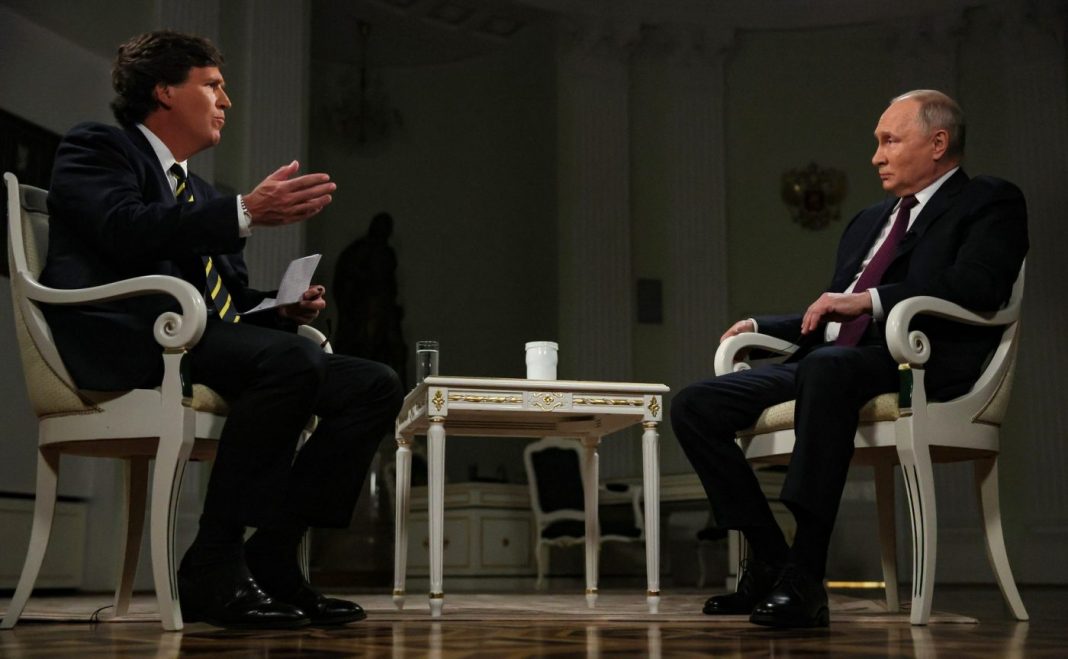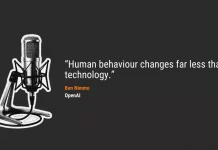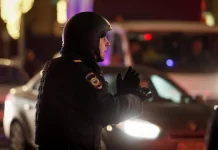By Edward Lucas, for CEPA
Communism was a fringe ideology until the Bolsheviks tried to put it into practice. The result was a system built first on mass murder and then systematic lies.
Vladimir Putin’s approach is similar: a flimsy theory leading to devastating results. He wants to eliminate Ukraine not just as a political entity but as a cultural and linguistic one. As he explained in his two hour, seven minute encounter with the American polemicist (I hesitate to call him a journalist) Tucker Carlson, Ukraine’s very existence is in his view a geopolitical and historical anomaly. Russia is, therefore, justified in taking military steps to end it. This is the same approach that Stalin took to the anomalous kulaks and to the deluded, obstinate souls who refused to accept the dictatorship of the proletariat.
It’s not just Ukraine. Poland featured at least 30 times in the television spectacle. The headline takeaway was Putin’s airy dismissal of any Russian pretensions on Poland or Latvia, with the get-out clause that Russia would respond if attacked from their territory (a provocation that can easily be staged if necessary). But more important was his characterization of Poland’s behavior in the run-up to the Second World War. The interwar republic, he said, had brought about its own downfall by first (allegedly) allying with Nazi Germany and then refusing to concede Hitler’s territorial claims. This supposedly “forced” the Nazi leader to attack them. This might be described as the wife-beater’s defense, “She made me do it.” It echoes Putin’s line on Ukraine: by refusing to concede Kremlin demands after 2014, politicians in Kyiv have only themselves to blame. Poles are wise to take their country’s defense so seriously.
The Russian leader’s historical claims involve cherry-picked facts and faulty logic. He simply ignores the chunks of the past that do not suit his argument. For example, a period of Russian rule bestows eternal legitimacy in his eyes. Other conquests of the same territory (by Mongols, Vikings, Lithuanians, and Poles, to name but some) are just temporary interruptions.
Putin detests more modern interruptions, too. His answers were long, even by the courtly standards of Russian political interviews. Carlson, who made his name in the quickfire world of American television talk shows, exercised his favorite furrowed-brow look to the point of exhaustion as Putin brushed aside all attempts to return their interaction to something resembling normal journalism.
Carlson also failed to ask Putin elementary questions about political repression, war crimes, diplomatic isolation, China, nuclear saber-rattling, emigration, and the collapse of Russian infrastructure. At some points, the Russian leader seemed to be mocking his American visitor, dropping into the conversation the allegation (not previously reported) that, as a young man, Carlson had applied to join the CIA. Carlson sucked up these humiliations and, in his introduction to the broadcast version of the interview, went as far as to praise Putin’s “encyclopedic” knowledge of history. Anyone training television journalists should play this performance as an example of how a lazy, opinionated, cowardly interviewer can be trampled by a seasoned professional. (I asked Carlson’s office for comment: no reply).
In the Soviet era, a handful of gullible, idealistic outsiders parroted the Communist lies. They were called ‘useful idiots’: useful to the Kremlin (and to the Chinese party-state), idiotic for their willful disregard of first-hand testimony about the true nature of the regimes they defended.
But the ‘useful idiots’ could at least plead idealism: a belief in a utopian future, however misty. Carlson’s hard-edged conservative credentials, deployed in the service of a hostile foreign power, leave him no such defense and require another, harsher word.
By Edward Lucas, for CEPA
Edward Lucas is a Non-resident Senior Fellow and Senior Adviser at the Center for European Policy Analysis (CEPA).
Europe’s Edge is CEPA’s online journal covering critical topics on the foreign policy docket across Europe and North America. All opinions are those of the author and do not necessarily represent the position or views of the institutions they represent or the Center for European Policy Analysis.





